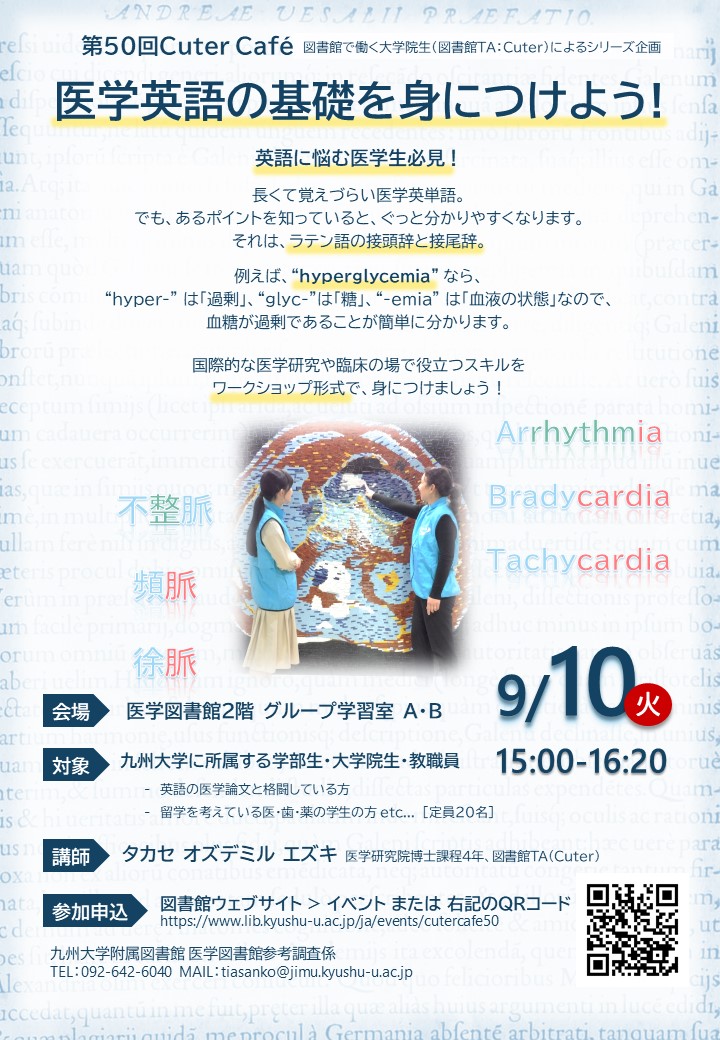
 長くて覚えづらい医学英単語。でも、あるポイントを知っていると、ぐっと分かりやすくなります。
長くて覚えづらい医学英単語。でも、あるポイントを知っていると、ぐっと分かりやすくなります。
それは、ラテン語の接頭辞と接尾辞。
例えば、“hyperglycemia” なら、“hyper-” は「過剰」、“glyc-”は「糖」、“-emia” は「血液の状態」なので、血糖が過剰であることが簡単に分かります。
国際的な医学研究や臨床の場で役立つスキルをワークショップ形式で身につけられるイベントが2024年9月に行われ、参加者の皆様から大変高評価をいただきました!
--------------------イベント詳細--------------------
【日時】2024年9月10日(火)15:00-16:20
【場所】医学図書館 2Fグループ学習室A・B(病院キャンパス)
【講師】図書館TA(Cuter) タカセ オズデミル エズキ
医学研究院博士課程 4年
----------------------------------------------------------
英語に悩む医学生にとって非常に役立つ本イベントの内容を、参加されなかった皆さんにもぜひ
知っていただきたく、内容をまとめたガイドを作成しました。
医学生もそうでない方も、ぜひご一読ください!
(※本ガイドは、図書館TA(Cuter) タカセ オズデミル エズキさんの作成したスライドやイベントの録画をもとに、図書館職員が作成したガイドになります。)
★図書館TA(Cuterとは?)
九州大学の各キャンパスの図書館で授業外学習を支援する図書館TAです。
詳しくはこちらから
|
|
|
タカセ オズデミル エズキ 医学系学府医学専攻 (神経内科学) |
まず、下記の文に目を通してみましょう。ハイライトしている単語は専門的で難しそうで、身構えてしまう方もいるのではないでしょうか。
長くて覚えづらい医学英単語を講師のタカセさんがいったいどうやって乗り越えたのか、このガイドで勉強していきましょう。
ガイドを読み終わったら、もう一度ここに戻って確認してみてください。
きっとすらすら読めるようになっているはずです!
――――――
Subjective: A 44-year-old woman was admitted to this hospital with 1 week of ongoing symptoms of dyspnea and vomiting. After 2 days of symptoms, she experienced dysphagia, panicked, and called an ambulance.
Objective: Medical history was notable for gastroesophageal reflux disease and hypothyroidism. She was taking levothyroxine 75 µg/day. There were no known drug allergies. Family history: The patient did not smoke tobacco or drink alcohol. Her mother had hypertension and a stroke.
Assessment: Temperature was 37.3°C. Hyperthermia was observed. The heart rate was 103 beats per minute showing arrhythmia, the blood pressure was hypotensive at 100/71 mm Hg, the respiratory rate was 27 breaths per minute, and the oxygen saturation was 95%. The thyroid gland was swollen on lateral side, tough, and without tenderness. Electrocardiography (ECG) showed arrhythmias, and a blood test showed elevated thyroxine (T4) levels.
Plan: No imaging examination was planned. Thyrotoxicosis caused by excessive intake of levothyroxine is considered.
――――――